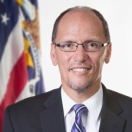
Ed. note: This is crossposted from Work in Progress, the official blog of the Department of Labor. See the original post here. Learn more about the history of Labor Day, and the history of the U.S. Department of Labor.
Labor Day 2013 is special. This year marks the centennial of the U.S. Department of Labor – 100 years of working for America’s workers. And this past week, our nation reaffirmed the ideals of the 1963 March on Washington. This transformational event, exactly 50 years ago, was just as much about labor rights as it was about civil rights.
For me, just like so many others then and now, these two movements are inextricably intertwined, their interests converging time and time again, their goals united in creating opportunity for all.
For a guy like me who grew up in an immigrant family from Buffalo, the past few days have been pretty heady. At the Lincoln Memorial Wednesday, I couldn’t help but wonder if The Rev. Martin Luther King Jr. ever imagined that half a century after he stood on these steps, another African-American man would stand there – as president?
For a moment, I celebrated how far we have come. And then I remembered that we also have a long journey still to complete.
I couldn’t help but wonder what was going on at the Labor Department 50 years ago. What was my predecessor doing and thinking, as the March on Washington began right outside his office windows, and on the eve of Labor Day 1963?
Well, it turns out, President Kennedy’s labor secretary, Willard Wirtz, was in the thick of it. Immediately after the march, Wirtz joined Kennedy and Vice President Johnson at an Oval Office meeting with Dr. King and other march leaders. A few days later, over Labor Day weekend, Wirtz was asked on a Sunday news talk show what was “most urgently on the minds” of the marchers. He replied: “Equality of opportunity in general, but the necessity particularly of equality of opportunity for work.”
Opportunity. Then and now, it’s about opportunity.
Fifty years later, on my first Labor Day as labor secretary, I’ll be going on talk shows to discuss opportunity, too. In fact, I want everyone to see the U.S. Department of Labor as the “Department of Opportunity.”
For 100 years, the department has played a critical role in creating opportunity and moving the nation forward. Our grit and determination has been put to the test recently, as we’ve endured the most crippling recession in 80 years.
We’ve turned a corner, thanks in large measure to the vision of the president and the work of the Labor Department. We’re creating jobs again, unemployment is at its lowest since 2008, and our economy continues to grow as we provide affordable health care for every American.
But again, there is still so much more to do … in skills training and education, workplace safety and health, retirement security and job creation. And in particular, we must do more to ensure an honest day’s pay for an honest day’s work.
People who work full-time in America should not have to live in poverty – simple as that. Too many jobs don’t pay enough to get by, let alone get ahead. Too many people are finding the rungs on the ladder of opportunity further and further apart. Workers around the country are bravely raising their collective voice and taking action to demand fair wages. We need to hear these voices. They are acting in the proud tradition of the marchers 50 years ago who took action for justice and dignity.
In his Wednesday speech, President Obama challenged us to address widening income inequality that is eroding the American Dream, invoking the marchers of 50 years ago who were engaged in that same struggle for economic justice. I join the president in the call for a higher minimum wage. It’s not just a moral imperative; it’s economic common sense. When we put more money in working families’ pockets, it boosts consumer demand, helping small businesses and jump-starting the entire economy.
Let’s use Labor Day 2013 as an opportunity to reflect on the men and women whose heads, hearts and hands have made ours the strongest economy the world has ever known.
Let’s spend this day honoring those who marched then, and those who march now. Let’s draw inspiration from their stories; emulate their strength and resolve; summon their dignity and courage.
Let’s do right by them.
And let’s create more opportunity for more working people in the years ahead.


